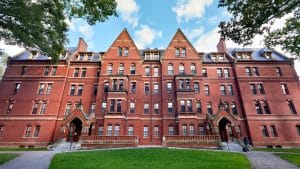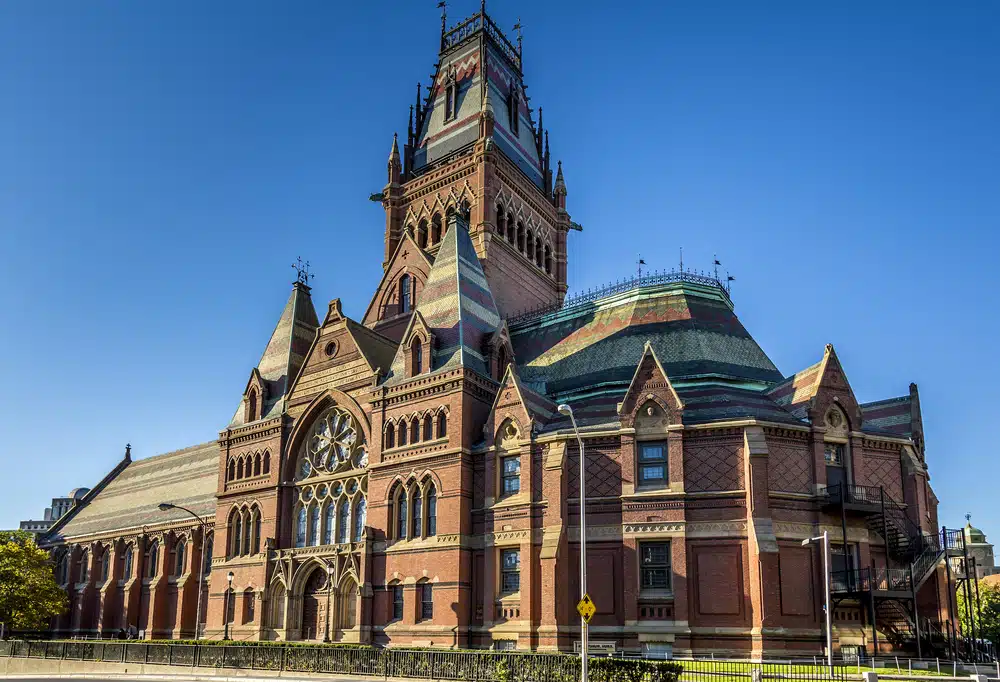Harvard University, established in 1636, is the oldest institution of higher education in the United States and is widely known worldwide as one of the world’s most prestigious universities. It was named after its first benefactor, the clergyman John Harvard. The university has grown from its humble beginnings, from nine students with a single master’s to an enrollment of more than 20,000 degree candidates. One of the programs offered here is the Harvard Computer Science Program.
The Computer Science program at Harvard, housed under the John A. Paulson School of Engineering and Applied Sciences (SEAS), is a modern development in the university’s longstanding tradition of academic excellence.
This program provides a robust and broad curriculum that teaches both the theoretical and practical aspects of computer science, intertwining technical skills with an understanding of the societal implications of technology. Students can study everything from algorithms and data structures to machine learning and artificial intelligence, as well as specialties like computational linguistics or graphics.
The program is renowned for its highly distinguished faculty, cutting-edge research, and dedication to preparing students to become leaders in various careers, ranging from academia and research to industry and entrepreneurship. Harvard’s Computer Science program is not just about coding; it’s about enabling students to leverage computational thinking and a deep understanding of technology to make a difference in the world.
Harvard University Computer Science Admission Requirements
Undergraduate Admission Requirements
Harvard University‘s undergraduate admissions process is highly competitive and requires several key components. Firstly, prospective students must provide their high school GPA and transcript, showcasing their academic performance throughout their high school career. Harvard typically seeks students with a strong academic record and a demonstrated commitment to learning.
Secondly, standardized test scores such as the SAT or ACT are typically required, with successful applicants usually ranking in the highest percentiles. However, Harvard has been known to practice a test-optional policy in certain circumstances, so it’s essential to check the current requirements.

Thirdly, as one of the requirements to enter Harvard Computer Science, letters of recommendation are an integral part of the application. These letters, typically from teachers or counselors, should speak to the applicant’s personal qualities, achievements, and readiness for college-level work.
Lastly, a personal statement or essay is required, allowing students to express their unique stories, experiences, and aspirations. This component allows the Harvard University Computer Science Admissions Committee to gain insight into the student’s personality, values, and potential contributions to the Harvard community.
Graduate Admission Requirements
Admission to Harvard University’s graduate programs in Computer Science, like its undergraduate programs, is extremely competitive. Firstly, applicants must have completed a bachelor’s degree from an accredited institution. While a Computer Science degree or a related field is often preferred, it is not strictly necessary if applicants can demonstrate sufficient foundational knowledge in the field.
Secondly, many programs require or recommend Graduate Record Examination (GRE) scores. While high scores can strengthen an application, they are just one factor among many that admissions committees consider. Thirdly, letters of recommendation are crucial. These should ideally come from professors or professionals in the computer science field who can attest to the applicant’s abilities, work ethic, and potential for success in a rigorous graduate program.
Fourthly, a Statement of Purpose is required. This essay should clearly articulate the applicant’s academic and research interests, career goals, and why they seek admission to Harvard’s program. It should also highlight how the applicant’s interests align with the strengths and focus of the Harvard program.
Lastly, research experience is highly valued for Harvard Computer Science graduate program applicants, especially those interested in a Ph.D. Demonstrated experience in conducting research, whether through an undergraduate thesis, independent projects, or work in a professional setting, can greatly enhance an application.
Harvard Computer Science Curriculum
Undergraduate Curriculum
Harvard University’s undergraduate curriculum in Computer Science is designed to provide a broad and robust understanding of the field while allowing for individual interests and specialties. Firstly, students must fulfill the General Education requirements, including diverse courses designed to ensure a well-rounded liberal arts education. These courses cover arts and humanities, social sciences, and natural sciences.
Secondly, the core Computer Science courses provide students with a solid foundation in the field. These courses typically include programming, algorithms, data structures, and systems, as well as theoretical aspects of computer science. Thirdly, students have a selection of elective courses, allowing them to delve deeper into specific areas of interest.
These electives may include topics like artificial intelligence, machine learning, cybersecurity, graphics, and computational linguistics. Lastly, many programs require or offer a senior project or thesis option.
This capstone experience allows students to apply what they’ve learned in a practical or research-oriented project, demonstrating their understanding and skills in a real-world or academic context. This project or thesis is often conducted under the guiding supervision of a faculty member and can be a stepping stone to further research or professional work in the field.
Graduate Curriculum
Harvard University’s graduate curriculum in Computer Science is structured to enable students to gain in-depth knowledge and expertise in their areas of interest while also conducting significant original research. Firstly, the core graduate courses provide students with a comprehensive understanding of advanced topics in computer science.

These courses delve deeper into advanced algorithms, machine learning, data science, cybersecurity, and more. The courses required vary based on the program and the student’s focus. Secondly, research requirements form a critical component of the Harvard Computer Science Curriculum for graduate students. Students are expected by the school to actively engage in research projects, often working closely with faculty members in their labs.
This hands-on experience is designed to prepare students for careers in academia, industry research, or advanced professional roles. Thirdly, doctoral students’ culmination of their studies is the doctoral thesis.
This substantial piece of original research is expected to contribute new and leading knowledge to the field of computer science. It is conducted through the guidance of a faculty advisor and is often published in academic journals or presented at conferences. The doctoral thesis is a testament to the student’s ability to perform independent research and contribute significantly to the field.
Harvard University Computer Science Research Opportunities
Undergraduate research opportunities
The university offers many research opportunities for the Harvard Computer Science program undergraduate students. These opportunities enable students to engage in practical applications of their coursework, work closely with faculty and graduate students, and contribute to cutting-edge research in various fields of computer science.
Research opportunities can take many forms. Students may choose to work on faculty-led research projects, often through research assistantships, where they can gain hands-on experience in conducting research and contribute to ongoing investigations. Independent research projects are also encouraged, often culminating in a senior thesis.
Additionally, the university hosts several research programs, such as the summer research opportunities program, which provides structured environments for undergraduates to engage in research. These experiences enhance students’ understanding of computer science concepts and help them develop essential skills like problem-solving, critical thinking, and collaboration. These opportunities can provide valuable experience for those considering graduate school or a research career.
Graduate research opportunities
At Harvard University, graduate students in the Computer Science program are presented with various research opportunities designed to cultivate their expertise and contribute to their professional development. These opportunities often involve close collaboration with faculty members and fellow graduate students, providing a rich intellectual growth and innovation environment.
Students can engage in research across various computer science sub-disciplines, including artificial intelligence, machine learning, data science, cybersecurity, and more. Many students participate in research groups or labs, contributing to ongoing projects and investigations under the guidance of faculty members.
Additionally, students often have the opportunity to propose and conduct their research projects, which can form the basis for their master’s thesis or doctoral dissertation. Beyond the department, numerous interdisciplinary research centers and institutes at Harvard intersect with computer science, providing further opportunities for collaborative research. These experiences deepen students’ understanding of the field and prepare them for careers of their choosing in academia, industry, and beyond, where research skills are highly valued.
Labs and research centers
The Harvard University Computer Science program is supported by several dedicated labs and research centers, providing a vibrant ecosystem for exploration and innovation in various computer science domains. These facilities give the students and faculty the opportunity to engage in cutting-edge research, often through interdisciplinary collaborations.
For instance, the Institute for Applied Computational Science (IACS) focuses on applying computational methods to solve complex problems in various disciplines. The Center for Research on Computation and Society (CRCS), another notable center, pursues research at the intersection of computer science and societal impact, addressing challenges in health care, economics, and privacy.

There’s also the Data Science Initiative, which fosters research and innovation in the growing field of data science. These labs and research centers not only offer opportunities for students to get involved in innovative research projects but also regularly host seminars and workshops, fostering a community of learning and intellectual exchange.
Harvard Alumni and Career Opportunities
Internship and co-op opportunities
The Harvard Computer Science program provides many opportunities for students to gain the necessary practical experience through internships and co-op programs. These opportunities allow students to apply their academic knowledge in real-world settings, develop professional skills, and establish connections in the industry.
Many students intern at leading tech companies in Silicon Valley and beyond, working on software development, data analysis, machine learning, and cybersecurity projects. Some even work in startup environments, providing a different learning experience. Besides these, co-op programs, which are extended internships, enable students to spend a semester or more working full-time at a company.
Harvard’s Office of Career Services offers resources and guidance to help students find suitable internships and co-ops. Many faculty members also use their industry connections to help students land these opportunities. Not only can these experiences provide a competitive edge in the job market post-graduation, but they can also help students understand what their career goals and interests are.
Career services and job placement rates
Harvard University’s Office of Career Services (OCS) provides various services and resources to support Computer Science students in navigating their career paths. The OCS offers one-on-one career advising, resume and cover letter reviews, mock interviews, and workshops on various career-related topics.
They also host job and internship fairs, allowing students to connect directly with potential employers. Additionally, the OCS maintains a job and internship database accessible to students and provides resources for navigating job offers and negotiations. Harvard has a strong reputation for high job placement rates across all disciplines.
Many Harvard Computer Science graduates secure positions at prestigious tech companies, startups, consulting firms, or continue in academia. The combination of a robust curriculum, extensive research opportunities, and practical internships or co-ops, all supported by dedicated career services, prepares students well for a successful transition into the workforce.
Notable alumni and their career paths
Harvard University’s Computer Science program boasts several notable alumni who have gone on to have a significant impact in various sectors. These Harvard Alumni exemplify the diverse career paths that a Computer Science degree can lead to. For instance, Mark Zuckerberg, co-founder and CEO of Facebook (now Meta Platforms Inc.), is perhaps one of the most famous dropouts from Harvard’s Computer Science program.

Bill Gates, a co-founder of Microsoft, is another renowned dropout. However, many alumni have completed their degrees and reached notable successes. For example, Ruchi Sanghvi became the first female engineer at Facebook and later co-founded the startup Cove, which Dropbox acquired.
Another notable alumnus, Tony Hsieh, was the CEO of online shoe and clothing retailer Zappos.com. Sal Khan, who earned a Master’s in Computer Science from Harvard, founded the Khan Academy, a free online education platform. These individuals illustrate the potential for innovation, leadership, and impact in various domains, from technology and entrepreneurship to education and beyond, with a Computer Science degree from Harvard.
Now that you have an idea about Harvard Computer Science, your college admissions to that university should be next on your mind. To ensure that you get into Harvard, you can get help with AdmissionSight. With ten years of experience with college admission experts, AdmissionSight can help you get into Harvard University. You can talk to our experts today to get an initial consultation.





































